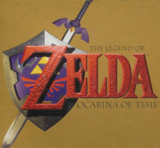Ten years later, and still going strong
The game starts off with one of Nintendo's flagship characters, Link, a young boy living in the forest with other Kokiri, small elf-like children who live in the forest. Our hero one day awakens to find he has been granted a fairy. Soon he is called to destroy a "virus" inside of the Kokiri's patron guardian, The Great Deku Tree. After doing so, Link is thrust into an adventure on a massive scale that transverses time itself.
The gameplay and combat are fairly simply, and easy to learn. "B" is used to attack, "A" for general commands such as conversing with the colorful supporting and stock characters and the C buttons to use various items and weapons you carry. Perhaps the somewhat simplistic combat gives the game it's strength when it comes to interesting and incredibly fun boss battles. The combat is also overshadowed by the very cleverly thought out puzzles that you'll find in the games various dungeons. Although the infamous Water Temple can be very tedious at times, the other dungeons make up for it easily.
The one aspect of the game that still continues to outlast anything else in the game are the characters. The main cast of characters such as Link, Zelda, and Ganondorf develop amazingly, but the true crown jewel are the supporting and background characters. As you converse with them through the years you gain a sense of identity both for yourself and the others in the cast. Every character in each of the towns and houses have something interesting and unique to say as well as providing side quests to help you grasp the world around you. The main characters in the game have stood the test of time, but when it comes down to it, I still always remember the Carpenter Boss or Darunia, The Sage of Fire as my favorites.
The game has also achieved a level of immersion I didn't experience until recently when I played The Elder Scrolls IV: Oblivion. The transition from child Link to his young adult counterpart work out almost flawlessly, and dozens of side quests from your childhood ultimately affect the later quests and dungeons. Such as planting magical beans early on and using the grown bean stalk to reach previously unaccessible areas or as shortcuts.
In the end, there is truly nothing wrong with this game, and any minor flaws are made up with even more extraordinary production values and cannot be called anything less than a masterpiece. Legend of Zelda: The Ocarina of Time, is and still remains one of the greatest video games of all time and stands as a testament to the Nintendo 64 generation.

